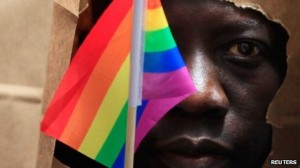
As of Monday, it became official in Uganda that being gay was a crime worthy of a life sentence in prison
By Curt Cramer
As of Monday, it became official in Uganda that being gay was a crime worthy of a life sentence in prison.
“No study has shown you can be homosexual by nature. That’s why I have agreed to sign the bill,” said Ugandan President Yoweri Museveni in a speech at the presidential palace. “They’re disgusting. What sort of people are they?” he told CNN afterward. “I never knew what they were doing. I’ve been told recently that what they do is terrible. But I was ready to ignore that if there was proof that that’s how he is born, abnormal. But now the proof is not there.”
In fact pretty much all of Uganda’s parliament hailed it as a victory for the modern family. The bills passing goes back to 2009 when it was first introduced, and from that time gays have been held hostage in a country with well over 36 million people (World Bank), that strongly conforms with a traditional African homophobic cultural past.
Western critics are offended by the legislation, enhanced especially since the country relies heavily on aid from many western nations. Current aid statistics put it to the tune of about $1 Billion according to BBC World. About $400 million of that aid provided comes from the US, and much of it goes towards the fragile health system of the country. Now, the US is reviewing its Ugandan assistance packages in the wake of Monday’s actions.
This was at the front of the mind of Uganda’s Health Minister, Dr. Ruhakana Rugunda, who reported yesterday that homosexuals will not be discriminated against when seeking health care. He urged them to still have full disclosure with Ugandan health care workers, and reassured the people in an interview with BBC Africa that health care professionals always will conform to doctor-patient confidentiality laws.
It seems contradictory that the state health system and parliament are not seeing eye to eye on the issue. But health charities are heavily vested in maintaining proper health care structure due to fears that the law will have disastrous effects on HIV response, in a country where the number of infected people is a dangerously high 1.2 million according to the CIA World Factbook.
From the surface, it seems ironic that fewer than 1% of transmissions are attributed to gay sex. The fact remains that gay men are significantly more likely to be HIV-positive over straight men in Uganda though, so where do the statistics add up? The problem is that in a country where gays need to pretend to be straight, heterosexual transmissions become more likely. In a study done by The Joint United Nations Programme on HIV/AIDS (UNAIDS) of Ugandan gay men, 78% had had sex with a woman, 20% were married to a woman, and 16% were living with a female partner engaged in a sexual relationship.
With Ugandan gays being silenced by fear for their lives, the state, UN, and charity healthcare units fear even worse for the rejuvenation of an AIDS pandemic that is all too hard to currently control in a country with poor access to first class medical care. Whichever solution is reached to this matter, without foreign aid, control will be made all the more difficult.
-Curt Cramer(@curtisremarc)


